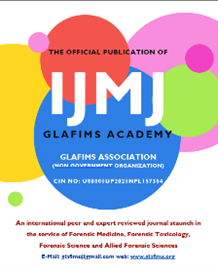Forensic Microbiology: A Comprehensive Review
DOI:
https://doi.org/10.5281/zenodo.15721831Keywords:
Key words: microbiology, fungus, virus, forensic, traceAbstract
Abstract
Forensic microbiology is an interdisciplinary field integrating microbiology with forensic science to aid legal investigations. It focuses on identifying and analyzing microbial communities—bacteria, fungi, and viruses—associated with human remains, environments, or objects. Its applications range from postmortem interval (PMI) estimation to bioterrorism detection and suspect identification. With the rise of molecular biology techniques, including metagenomics and next-generation sequencing, forensic microbiology has become increasingly relevant when traditional methods prove insufficient, such as in cases involving skeletal or extensively decomposed remains1. Each individual and environment harbours a unique microbial signature, enabling forensic investigators to use microbiomes as trace evidence2. These signatures are shaped by ecological, geographic, and physiological factors, offering specificity in linking evidence to people or places3. This review presents a comprehensive overview of methodologies, applications, and significant developments in forensic microbiology, while also discussing limitations and future directions4.

Downloads
Published
How to Cite
Issue
Section
License
Copyright (c) 2025 International Journal of Medical Justice

This work is licensed under a Creative Commons Attribution-NonCommercial 4.0 International License.
Copyright Policy Summary – International Journal of Medical Justice (IJMJ):
IJMJ is an open access journal. All articles are published under the Creative Commons Attribution 4.0 International License (CC BY 4.0). This allows others to freely access, share, reproduce, and create derivative works, provided proper credit is given to the original authors. Authors retain full ownership of their work.

